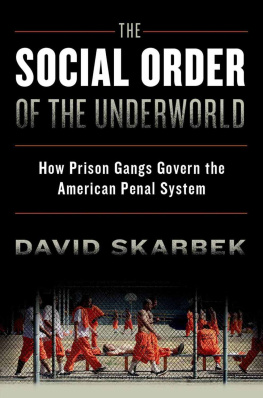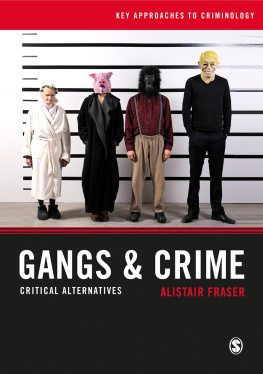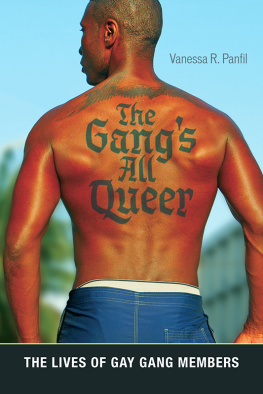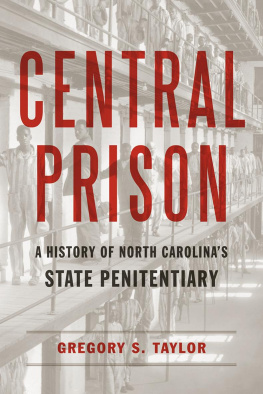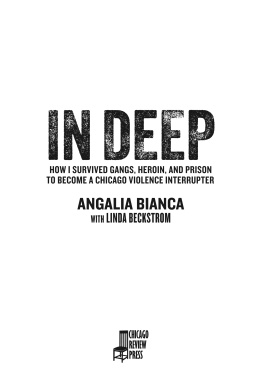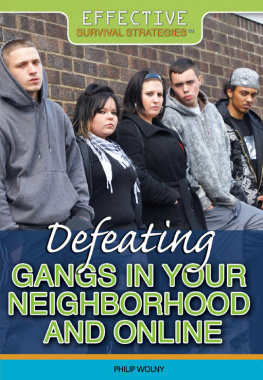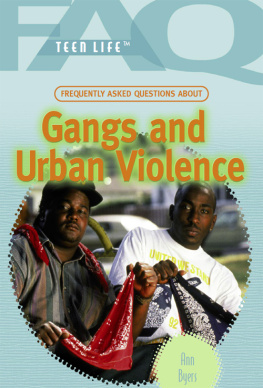
The Social Order of the Underworld
David Skarbeks The Social Order of the Underworld can be read with great profit on each of three levels: it is an engrossing ethnography of American prison life; it is a penetrating economic analysis of the organization of the drug trade; and it offers an innovative theory of how an effective governing institution can originate in the wild and exert legitimate domination over its subjects. This book is a stunning achievement that makes me proud to be a social scientist.David D. Laitin, Watkins Professor of Political Science, Stanford University
Meticulously researched and convincingly argued. Skarbeks book
is an outstanding addition to our understanding of self-governance,
its ubiquity, and effectiveness.Peter T. Leeson, George Mason
University, and author of The Invisible Hook: The Hidden Economics ofPirates
Skarbeks study of California prison gangs offers delightfully fresh perspective on the relationship between underworlds informal institutions. He argues that gangs evolved as substitutes for another set of informal rules, i.e., systems of criminal codes. The rules constantly evolve to lower transaction costs and often stabilize interactions and reduce chaotic violence unrelated to business enforcement. This is
a first rate and novel take on the structure of organized criminal enterprises.Marek Kaminski, University of California, Irvine, and
author of Games Prisoners Play
The Social
Order of the
Underworld
How Prison Gangs Govern
the American Penal System
z
DAVID SKARBEK
Oxford University Press is a department of the
University of Oxford. It furthers the Universitys objective
of excellence in research, scholarship, and education
by publishing worldwide.
Oxford New York
Auckland Cape Town Dar es Salaam Hong Kong Karachi
Kuala Lumpur Madrid Melbourne Mexico City Nairobi
New Delhi Shanghai Taipei Toronto
With offices in
Argentina Austria Brazil Chile Czech Republic France Greece
Guatemala Hungary Italy Japan Poland Portugal Singapore
South Korea Switzerland Thailand Turkey Ukraine Vietnam
Oxford is a registered trade mark of Oxford University Press
in the UK and certain other countries.
Published in the United States of America by
Oxford University Press
198 Madison Avenue, New York, NY 10016
Oxford University Press 2014
All rights reserved. No part of this publication may be reproduced,
stored in a retrieval system, or transmitted, in any form or by any means, without the prior permission in writing of Oxford University Press,
or as expressly permitted by law, by license, or under terms agreed with the appropriate reproduction rights organization. Inquiries concerning reproduction outside the scope of the above should be sent to the
Rights Department, Oxford University Press, at the address above.
You must not circulate this work in any other form
and you must impose this same condition on any acquirer.
Library of Congress Cataloging-in-Publication Data
Skarbek, David.
The social order of the underworld : how prison gangs govern the
American penal system / David Skarbek.
pages cm
Includes bibliographical references.
ISBN 978-0-19-932849-9 (hardback : alk. paper)ISBN 978-0-19-932850-5 (pbk. : alk. paper) 1. Prison gangsUnited States. 2. Prison administrationUnited States.
3. Prison violenceUnited States. 4. PrisonersUnited States. I. Title.
HV6439.U5S557 2014
365'.6dc23
2013041577
1 3 5 7 9 8 6 4 2
Printed in the United States of America
on acid-free paper
For Emily
Contents
xi
ive been extremely fortunate to have the encouragement and guidance of outstanding colleagues during the process of writing this book, and I am especially grateful to everyone who commented on drafts of the manuscript.
I owe thanks to Lee Benham, Stewart Dompe, Brendan Dooley, Philip
Goodman, William Keech, Gary Libecap, Benjamin Powell, Mary Shirley, and Edward Stringham for providing suggestions on individual chapters.
Several people generously provided comments on the entire manuscript
many thanks to Paolo Campana, Paul Dudenhefer, Mark Kleiman, Peter
Leeson, Adam Martin, John Meadowcroft, Darrell Padgett, Jason Sexton, Daniel Skarbek, and Kristen Skarbek. Michael Mungers detailed comments at an early stage of the project were tremendously helpful. Peter Boettke encouraged my academic interest in self-governance, and he has been a constant source of intellectual guidance and inspiration. Peter Leesons research on self-enforcing exchange and criminal organization laid much of the foundation for this work. I am especially grateful for the extensive comments that he has provided to me on this and other projects. Paul Orozco deserves special thanks for sparking my initial interest in prison social order.
I presented several chapters in the Political Economy seminars at Duke University and Kings College London, which generated a long list of useful comments and suggestions. Seminar participants at the Center for International Security and Cooperation at Stanford University provided excellent suggestions, as did my insightful commentator, David Laitin. Participants in the Economics of Crime working group at the National Bureau of Economic
Researchs Summer Institute provided important feedback. Many thanks to the directors of the working groupPhilip J. Cook, Jens Ludwig, and Justin McCraryand especially to my thoughtful discussant, Mark Kleiman.
The book builds on earlier articles that benefited from helpful suggestions by many of those listed above and by Jason Aimone, Daniel DAmico, Eli Dourado, John Nye, Doug Rogers, Matt Ryan, Daniel Smith, Virgil Storr, xii
Acknowledgments
Daniel Sutter, Diana Thomas, Michael Thomas, and Georg Vanberg. I thank Elsevier for allowing me to use ideas from my article Prison Gangs, Norms, and Organizations ( Journal of Economic Behavior & Organization 2012; 82(1): 96109), which informs Chapter 2. I thank Oxford University Press for permission to use material from my article Putting the Con into Constitutions: The Economics of Prison Gangs ( Journal of Law, Economics,
& Organization 2010; 26(2): 183211) in part of Chapter 5. Finally, I am grateful to Cambridge University Press, which granted permission to reuse material from my article Governance and Prison Gangs ( American Political ScienceReview 2011; 105(4): 702716) in Chapter 6. I owe special thanks to the co-editors at the APSR, who went above and beyond their editorial duties in providing detailed comments on my paper and on broader issues related to this research project.
At Oxford University Press, I benefited greatly from the invaluable
feedback provided by my editor, David McBride, and from the skillful work of the production staff. Two anonymous reviewers also made suggestions that helped me write a more cogent and coherent book. The Earhart Foundation provided financial support for this project, for which Im exceptionally grateful.
My wife Emily commented on numerous drafts of every chapter, and she has been gracious and encouraging during my al -too-frequent updates on the books status. Marrying an economist means that I am lucky enough to have someone with whom I can discuss economics nightly over dinner, and this was a great help in refining many of these ideas. I wouldnt have been able to write this book without her intellectual insights and her constant encouragement, love, and support.
Next page
